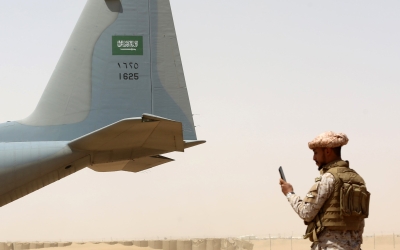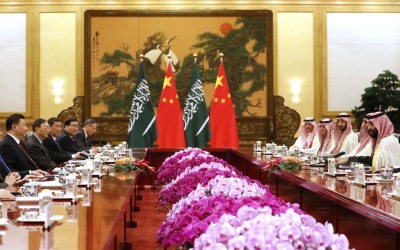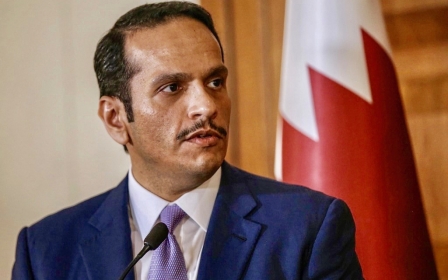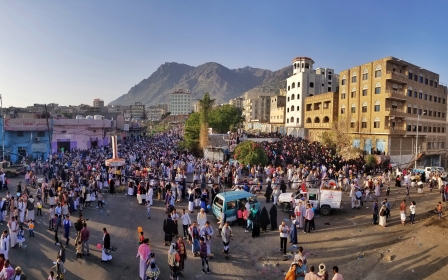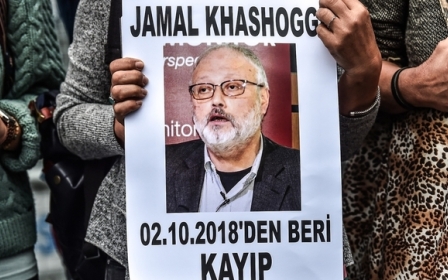How a history of US-Saudi ties turned into billion-dollar arms deals
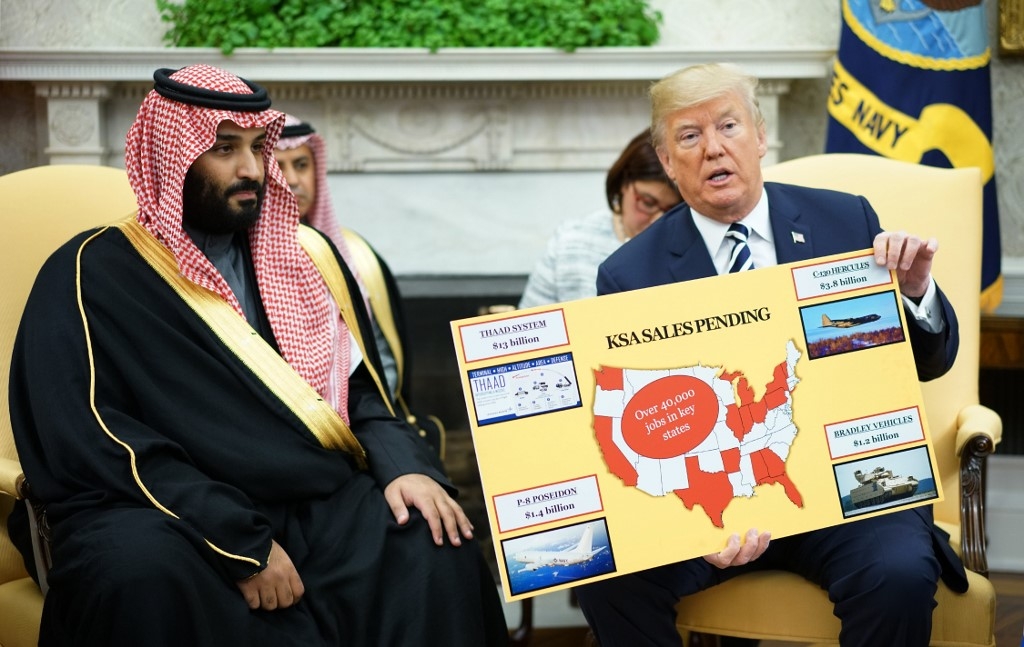
Congress once again is preparing for a major battle with the Trump administration as the US president seeks to expedite the shipment of billions of dollars in weapons to Saudi Arabia without any congressional oversight.
Critics of Donald Trump's continued support for the Gulf country - and US arms sales to the Saudi government in particular - have grown increasingly fed up with what they view as Riyadh's intransigence.
But with Trump insisting that the weapons deals are a key part of his administration's plan to maintain strong ties between Washington and Riyadh, a major shift appears unlikely, several experts told Middle East Eye.
"The argument has been that [arms sales] buy the United States leverage on things like human rights," said Jodi Vittori, a non-resident scholar at the Carnegie Endowment's Democracy, Conflict, and Governance Program.
"But it's hard to see where one can find ... that leverage used successfully," she told MEE. "The [Saudi] human rights record is only getting worse."
New MEE newsletter: Jerusalem Dispatch
Sign up to get the latest insights and analysis on Israel-Palestine, alongside Turkey Unpacked and other MEE newsletters
Longstanding ties
To understand how the US-Saudi relationship became so entrenched, as well as how the rulers in Riyadh have been emboldened under US patronage, one has to go back to the beginnings of the modern Saudi state.
In 1933, less than a year after the country was founded, Saudi Arabia granted oil exploration permits to a party of American geologists with Standard Oil of California (SoCal), a predecessor to US oil giant Chevron.
Oil was struck five years into the exploration mission, solidifying US-Saudi relations for decades to come; the partnership between SoCal and Saudi Arabia became known as the Arabian American Oil Company (Aramco).
At the height of World War II, President Franklin Roosevelt deepened the US's relationship with Saudi Arabia, declaring that the country's defence "is vital to the defence of the United States".
Roosevelt began sending US military aid to the country in 1943 through the US's lend-lease programme, which supplied a total of $50bn in military equipment to 30 different countries.
In return, Saudi Arabia granted the US the right to build airfields in its territory.
In 1951, Washington and Riyadh signed the Mutual Defense Assistance Agreement, which became the basis of US arms sales to the kingdom and created a permanent US military training mission in Saudi Arabia.
Throughout the 1950s and 1960s, the relationship continued to expand, as did the flow of US-made weapons to the kingdom.
Between 1950 and 1969, the US provided a total of $218m in foreign military sales to Saudi Arabia, according to the US's Defense Security Cooperation Agency (DSCA).
By the early 1970s, as Britain was pulling out of the Gulf - a move that allowed Bahrain, Qatar, the United Arab Emirates and Oman to declare independence - the US saw a chance to double-down on its own interests in the region.
And between 1970 and 1972, the total value of US arms sales to Riyadh skyrocketed from $14.8m to $296.3m, according to the DSCA.
That increase in weapons purchases coincided with an incredible boost in oil revenues for the Saudi government, which pulled in $25.7bn in 1975 - up from $1.2bn in 1970.
Today, Saudi Arabia only supplies about 9 percent of all crude oil imports to the US, as Washington focuses on domestic resources. US weapons, however, continue to flow freely into the kingdom.
Between 2013 and 2017, Riyadh purchased about 18 percent of all US arms sales, totalling around $9bn, according to a report by the Stockholm International Peace Research Institute, which tracks weapons flows worldwide.
That amount is nearly equal to the $8.1bn weapons sale to Saudi Arabia and the UAE that the Trump administration has backed despite objections from Congress.
Congress pushing back
The US president's decision to push that sale through - after invoking a state of emergency - comes at a time of unparalleled scrutiny of Saudi Arabia on Capitol Hill, thanks in large part to the devastating Saudi-led war in Yemen and the murder of journalist Jamal Khashoggi.
Over the last two years, Congress has tried to use its authority to pressure Riyadh to end the war in Yemen through multiple avenues.
One of these was a freeze on US arms sales to the kingdom and the UAE, a key partner in the Saudi-led coalition in the war-torn country.
But the US president has been adamant that Washington's support for Riyadh must continue, and Trump's recent decision defies Congress, which has since introduced 22 resolutions to challenge the planned weapons transfer.
'This status quo seems like it won't continue forever, especially if these brazen acts by Saudi Arabia were to continue'
- Seth Binder, Project on Middle East Democracy
"Regardless of whether lawmakers are successful in blocking the Trump administration's weapons deal, pressure should be on Saudi Arabia to fall more in line with US attitudes," said Seth Binder, advocacy officer at the Project on Middle East Democracy (POMED).
"But nothing about Saudi [Arabia]'s actions indicate a shift in its human rights practices."
Despite US lawmakers' recent protestations, Binder said that the Trump administration's acceptance of Saudi Arabia's recent behaviour is "an alarming yet telling sign that the status quo is holding".
"But with that said, what is clearly happening is more and more members of Congress are pushing back against it … There is growing momentum," Binder said.
"This status quo seems like it won't continue forever, especially if these brazen acts by Saudi Arabia were to continue."
'An arms race with only one side racing'
But for now, Saudi Arabia appears comfortable under the Trump administration's protection, Binder said, citing the emergency declaration as a "perfect example" of how the president has shielded the Gulf country from accountability.
Jeff Abramson, a senior fellow at the Arms Control Association, a non-partisan group focused on effective arms control policies, agreed.
"Clearly the US is not buying the influence they think they are, given Saudi [Arabia]'s behaviour in Yemen," Abramson told MEE in a phone interview.
Saudi Arabia has other options in terms of buying weapons - something Trump himself has cited as a justification for continuing to authorise the arms transfers, even after the murder of Khashoggi at the Saudi embassy in Istanbul last autumn.
"They're going to take that money and spend it in Russia or China or someplace else," Trump said the week after Khashoggi's killing, on 2 October.
Other countries also offer weapons that the US does not, such as ballistic missile technology, the sale of which is banned in the US under a regulation barring the sale of rockets capable of carrying weapons of mass destruction.
For its part, Saudi Arabia has made it clear that it views its weapons programme as both a way to maintain control over its own population and to challenge its enemies in the region, namely Iran.
"Saudi Arabia does not want to acquire any nuclear bomb, but without a doubt, if Iran developed a nuclear bomb, we will follow suit as soon as possible," Saudi Crown Prince Mohammed bin Salman told US broadcaster CBS in an interview last year.
Now, with billions of dollars in US weapons set to make their way to Saudi Arabia, that arms race appears likely to escalate.
"We have a situation where the Gulf Cooperation Council is arming up ... as a counter to Iran, but Iran is really not there in terms of arms. It's an arms race with only one side racing," Abramson said.
"The imbalance of power is really striking."
Middle East Eye delivers independent and unrivalled coverage and analysis of the Middle East, North Africa and beyond. To learn more about republishing this content and the associated fees, please fill out this form. More about MEE can be found here.


